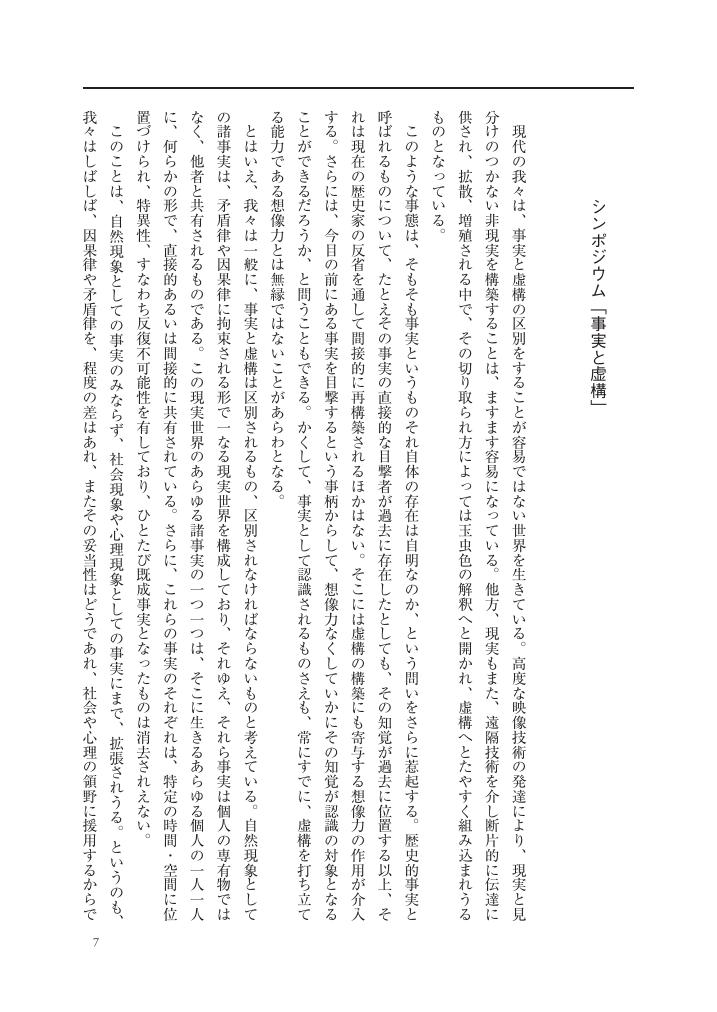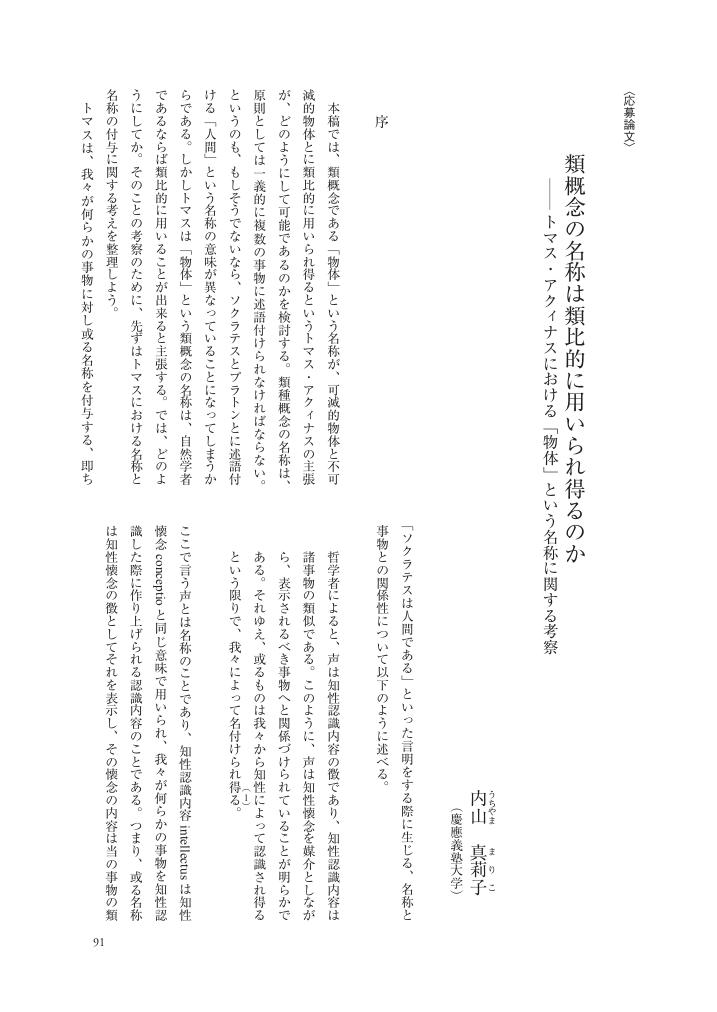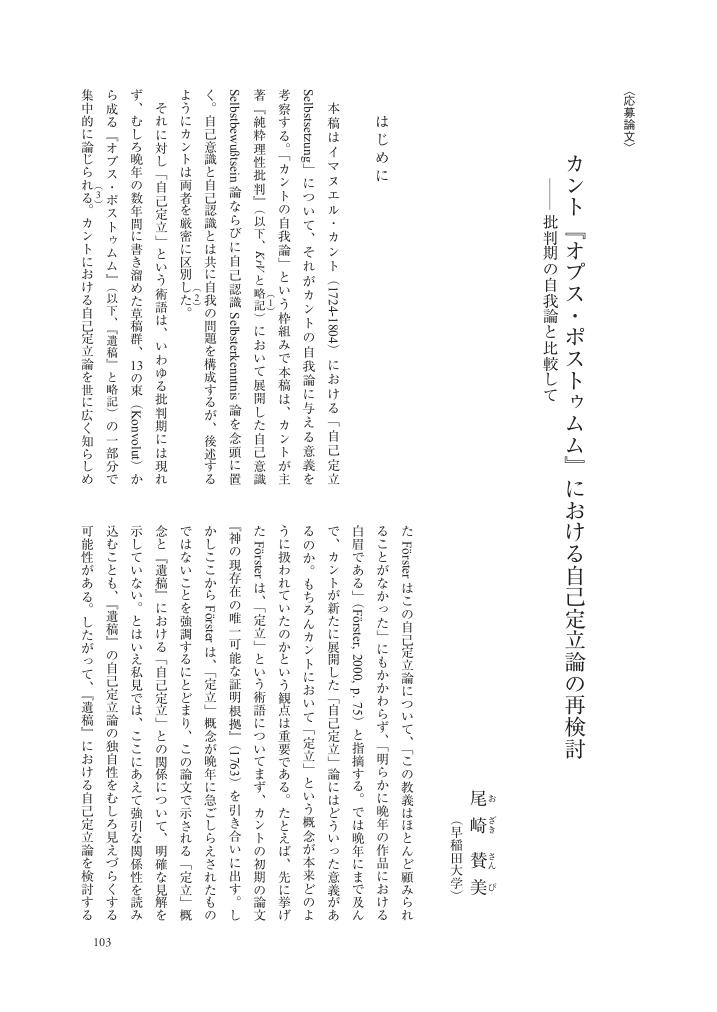1 0 0 0 OA 隠された内面性から、外的世界との衝突へ キルケゴールの「内面性」概念を再解釈する試み
- 著者
- 吉田 敬介
- 出版者
- 日本哲学会
- 雑誌
- 哲学 (ISSN:03873358)
- 巻号頁・発行日
- vol.2021, no.72, pp.188-199, 2021-04-01 (Released:2021-05-20)
- 参考文献数
- 17
1 0 0 0 OA シンポジウム「事実と虚構」報告
- 著者
- 長坂 真澄 柏端 達也
- 出版者
- 日本哲学会
- 雑誌
- 哲学 (ISSN:03873358)
- 巻号頁・発行日
- vol.2022, no.73, pp.7-9, 2022-04-01 (Released:2022-07-21)
1 0 0 0 OA デリダと虚構性の問い 歴史、証言、嘘
- 著者
- 亀井 大輔
- 出版者
- 日本哲学会
- 雑誌
- 哲学 (ISSN:03873358)
- 巻号頁・発行日
- vol.2022, no.73, pp.25-36, 2022-04-01 (Released:2022-07-21)
- 参考文献数
- 3
1 0 0 0 OA 学協会シンポジウム「論理と倫理――『論考』一〇〇年を機に」報告
- 著者
- 伊勢 俊彦 千葉 清史
- 出版者
- 日本哲学会
- 雑誌
- 哲学 (ISSN:03873358)
- 巻号頁・発行日
- vol.2022, no.73, pp.49-51, 2022-04-01 (Released:2022-07-21)
1 0 0 0 OA 男女共同参画ワークショップ 「学術における男女共同参画の現状と課題」報告
- 著者
- 吉原 雅子
- 出版者
- 日本哲学会
- 雑誌
- 哲学 (ISSN:03873358)
- 巻号頁・発行日
- vol.2021, no.72, pp.52-54, 2021-04-01 (Released:2021-05-20)
- 著者
- 縣 由衣子
- 出版者
- 日本哲学会
- 雑誌
- 哲学 (ISSN:03873358)
- 巻号頁・発行日
- vol.2021, no.72, pp.55-66, 2021-04-01 (Released:2021-05-20)
1 0 0 0 OA 分析哲学のいわゆる「心理学的起源」について
- 著者
- 伊藤 遼
- 出版者
- 日本哲学会
- 雑誌
- 哲学 (ISSN:03873358)
- 巻号頁・発行日
- vol.2021, no.72, pp.67-78, 2021-04-01 (Released:2021-05-20)
- 参考文献数
- 12
1 0 0 0 OA 後期西田存在論の基礎 世界・表現・主体
- 著者
- 猪ノ原 次郎
- 出版者
- 日本哲学会
- 雑誌
- 哲学 (ISSN:03873358)
- 巻号頁・発行日
- vol.2021, no.72, pp.79-90, 2021-04-01 (Released:2021-05-20)
- 著者
- 内山 真莉子
- 出版者
- 日本哲学会
- 雑誌
- 哲学 (ISSN:03873358)
- 巻号頁・発行日
- vol.2021, no.72, pp.91-102, 2021-04-01 (Released:2021-05-20)
1 0 0 0 OA カント『オプス・ポストゥムム』における自己定立論の再検討 批判期の自我論と比較して
- 著者
- 尾崎 賛美
- 出版者
- 日本哲学会
- 雑誌
- 哲学 (ISSN:03873358)
- 巻号頁・発行日
- vol.2021, no.72, pp.103-114, 2021-04-01 (Released:2021-05-20)
- 参考文献数
- 8
1 0 0 0 OA 自我に対する現象学的反省の有効性 フッサールにおける自我論の再検討に向けて
- 著者
- 佐藤 大介
- 出版者
- 日本哲学会
- 雑誌
- 哲学 (ISSN:03873358)
- 巻号頁・発行日
- vol.2021, no.72, pp.115-126, 2021-04-01 (Released:2021-05-20)
- 参考文献数
- 10
1 0 0 0 OA シンポジウム「自由と自由意志」趣意
- 著者
- 伊勢 俊彦 田坂 さつき
- 出版者
- 日本哲学会
- 雑誌
- 哲学 (ISSN:03873358)
- 巻号頁・発行日
- vol.2021, no.72, pp.7-8, 2021-04-01 (Released:2021-05-20)
1 0 0 0 OA 哲学教育ワークショップ 「専門職教育に生きる哲学教育」報告
- 著者
- 寺田 俊郎
- 出版者
- 日本哲学会
- 雑誌
- 哲学 (ISSN:03873358)
- 巻号頁・発行日
- vol.2021, no.72, pp.49-51, 2021-04-01 (Released:2021-05-20)
1 0 0 0 OA 批判と歴史 ――アドルノとベンヤミンのマルクス理解にそくして――
- 著者
- 麻生 博之
- 出版者
- 日本哲学会
- 雑誌
- 哲学 (ISSN:03873358)
- 巻号頁・発行日
- vol.2010, no.61, pp.85-104_L7, 2010 (Released:2011-01-18)
- 参考文献数
- 26
If one were to reread Marx's writings today, which would be the phase of Marx's thought that would merit special attention? In this paper, I find that one core of Marx's thoughts lies in “critique.” I would therefore like to explore the significance that this critique can have as a form of fundamental thought. With this in mind, I want to consider Adorno's and Benjamin's interpretation of Marx's thought, with particular reference to their emphasis on “history”. Adorno characterizes Marx's thought as “a critical theory of society” and thinks that it is only understandable as “a historical theory”. Adorno's view is remarkable in that it characterizes Marx's thought as a form of “interpretation (Deutung)” of “natural history (Naturgeschichte)”. This can be seen as an attempt, on the one hand, to show that various societal realities that should have historical reality appear as something inevitable or as things which obey “the coercion of nature”, but on the other hand, to perceive such realities in the form of something natural or eternal which have become historically, therefore as things which are fundamentally contingent. Benjamin, in contrast, thinks that one core of Marx's thoughts consists in the recognition of history as a “critique” to uncover “the memory of the anonymous (das Gedächtnis der Namenlosen)”. In Benjamin's view, when history up to the present is grasped as something continuous, it is just a “continuum of the oppressors”. Benjamin defines the form of history description that liquidates “the epic element” of this continuous history as “construction”, and tries to understand an essential part of the Marx's thought as such an attempt to explode “the continuum of history” and to rescue “the tradition of the oppressed”.In this paper, through my clarification of Adorno's and Benjamin's understanding of Marx's thought, I attempt to examine the significance of Marx's “critique” of “history” and, through it, offer a worthy topic for further discussion.
1 0 0 0 OA 意識の命題 実在論の基礎付け
- 著者
- 川戸 好武
- 出版者
- 日本哲学会
- 雑誌
- 哲学 (ISSN:03873358)
- 巻号頁・発行日
- vol.1963, no.13, pp.31-47, 1963-03-31 (Released:2009-07-23)
- 参考文献数
- 32
1 0 0 0 OA 可能世界意味論と形而上学
- 著者
- 野本 和幸
- 出版者
- 日本哲学会
- 雑誌
- 哲学 (ISSN:03873358)
- 巻号頁・発行日
- vol.1981, no.31, pp.57-83, 1981-05-01 (Released:2009-07-23)
1 0 0 0 OA 哲学における「女性たちの場所」
- 著者
- 北川 東子
- 出版者
- 日本哲学会
- 雑誌
- 哲学 (ISSN:03873358)
- 巻号頁・発行日
- vol.2007, no.58, pp.45-60,18, 2007-04-01 (Released:2009-07-23)
Es is Judith Butlers Buch „Gender Trouble“ (1990), das der feministischen Philosophie eine neue diskursanalytische und machtkritische Dimension offnete. Mit Butler konnte sich die feministische Philosophic von der begrenzten Form der Philosophie fur Frauen befreien und zur Philosophic uber symbolische Unterdruckung and ihre machtpolitischen Konsequenzen entwickeln. Gleichzeitig hat aber „Gender Trouble” die Bedeutung der feministischen Philosophic auf eine allgemeine Theorie von Gender hin relativiert, indem es den begrifflichen Rahmen der feministischen Philosophie uberhaupt radikal in Frage gestellt hat. Vor allem hat Butler gezeigt, dass die Frau als Subjekt selber ein Produkt der symbolischen Macht ist, so dass jede Rede von Weiblichkeit bereits von der Machstruktur bestimmt ist, die gerade Weiblichkeit and Frauen unterdruckt. Mit dieser diskursanaly-tischen Wende scheint sich die feministische Philosophic in einer umfangreichen philoso-phischen Theorie von Gender als Performative aufzulosen. Die Betonung der weiblichen Perspektive und der weiblichen Erfahrugen soll demnach nicht mehr der methodische Ausgangspunkt der Gender Theorie sein. Bevor man aber mit dieser vorlaufigen Bestand-aufnahme der feministischen Philosophie ein Ende ankundigt, sollte man noch einmal genauer betrachten, wie das Verhaltnis zwischen der feministischen Philosophie mit ihrem politischen and sozialen Pathos and der philosophischen Gender Theorie im Sinne von Butler, die das Problem Gender vordergrundig als Diskurs-Politik und Performative an-sieht, zu verstehen ist. In meinem Aufsatz wird versucht, von gewissen gedanklichen Ansatzen der feministischen Philosophie, vor allem ihrer Frauen-Perspektive her ein Bild von der philosophischen Gender Theorie zu gewinnen, das die zwei scheinbar einander ausschließnde Kategorien“ Weiblichkeit und Gender” in einen synthetischen Zusammen-hang zu bringen vermag.
1 0 0 0 OA 道徳的実在論と規則遵守問題
- 著者
- 水本 正晴
- 出版者
- 日本哲学会
- 雑誌
- 哲学 (ISSN:03873358)
- 巻号頁・発行日
- vol.2006, no.57, pp.210-226,12, 2006-04-01 (Released:2009-07-23)
- 参考文献数
- 25
In this paper I defend moral realism by considering Wittgenstein's remarks on rule-following in his Philosophical Investigations. Due to the lack of any positive theory in Wittgenstein's text, this argument is supplemented by my reconstruction of Wittgenstein's theory of aspect in Part II of Investigations. In trying to answer the "paradox" of rule-following made famous by Kripke, I will show that, in the spirit of direct realism, an aspect of normativity, if it the has proper surroundings (Umgebung), is a fact of normativity, which rules that the subject ought to do such and such.This basic thesis is coupled with the (Sellars-McDowell's) idea of the space of reasons, which is also joined with the idea of fact causation. As a result, we can think that moral facts or facts of normativity do have causal efficacy, as long as they are reasons for action. This theory is, therefore, naturalistic as well as rationalistic, although this "naturalism" is in the sense of second nature a la McDowell. The notion of aspect itself will also be given a naturalistic interpretation analogous to the Gibsonian conception of information.The paper will proceed more like drawing a (better, alternative) picture, than giving a set of arguments, because of the nature of the topic.
1 0 0 0 OA 「子どもの哲学」が問いかけるもの その教育理論と哲学的問題
1 0 0 0 OA イメージと身体 共通感覚論の観点から
- 著者
- 中村 雄二郎
- 出版者
- 日本哲学会
- 雑誌
- 哲学 (ISSN:03873358)
- 巻号頁・発行日
- vol.1980, no.30, pp.41-59, 1980-05-01 (Released:2009-07-23)
















